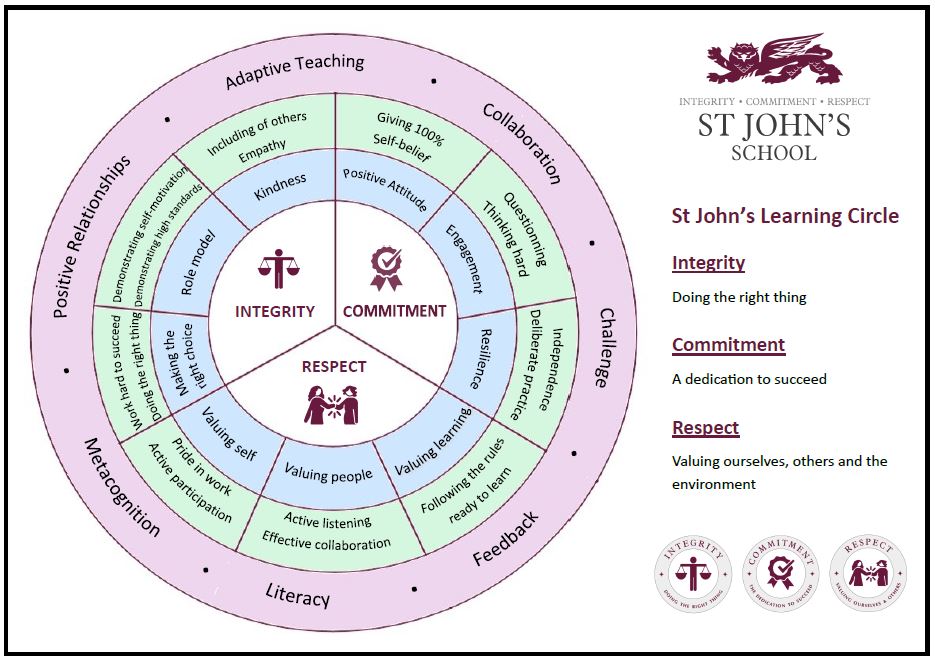‘A curriculum which provides every student with the means to excel academically and develop into the best version of themselves’

At St John’s School we aim to provide an appropriate, inclusive and vibrant curriculum which, (in conjunction with lesson delivery) should inspire and motivate our students to achieve the best possible outcomes. We want our students to leave school as well qualified, articulate and responsible students who share our core values of Integrity, Commitment and Respect. Our curriculum aims to eliminate educational disadvantage caused by mobility.
The rationale and structure of our curriculum design is presented within the following documents:
- Our curriculum map, which outlines subjects studied at Key Stage 3 and Key Stage 4 (See appendix 1)
- Our 5-year curriculum plans which specify the intent, implementation and impact of each individual subject.
Year 7,8 and 9 students are taught the following subjects:
- Art
- Computer Science
- Design and Technology
- Drama
- English
- Food Technology
- Geography
- History
- Mathematics
- Modern Languages
- Music
- Personal, Social and Health Education
- Physical Education
- Religious Education
- Science
Click below to view year 7-9 Curriculum terms:
At the end of Year 9 pupils choose the options that they will be studying in Years 10 & 11. Information about these courses is circulated in the Spring Term with an Options Evening for Parents.
Certain subjects are compulsory during Years 10 & 11. These are:
- English Language
- English Literature
- Science
- Mathematics
- Physical Education
- Personal, Social and Health Education
Currently Years 10 and 11 Optional Courses include:
- Art & Design – Fine Art
- Product Design
- Computer Science
- Drama
- Food Technology
- French
- German
- Geography
- History
- Physical Education
- Music
- Business Studies
If you would like to receive any further information on our curriculum, please do not hesitate to contact us.
Our curriculum is the vehicle to deliver our whole school vision:
‘Eliminating educational disadvantage caused by mobility’
To achieve the vision, we aim to create a vibrant school which provides every student with the means to excel academically and develop into the best version of themselves’
We offer a curriculum which we believe is appropriate for the learners at St John’s School. This is achieved by valuing learner habits which are underpinned by our whole school values:

Our key priorities for our curriculum are currently:
- Equipping students with knowledge that they need for success in education and in later life and ensuring that no student is disadvantaged by social mobility
- Ensuring the ongoing promotion of positive values and learning characteristics in order that our pupils are best prepared for the next stage in their education or working life
- Provide a curriculum that is coherently planned and sequenced and which helps our pupils understand links between curriculum subjects.
We believe that through a challenging yet broad curriculum, our students will be inspired to achieve in all they do. They will leave us as well-rounded, respectful individuals with all the skills they need to equip them to belong and flourish within our unique MOD community and in an ever-changing world.
Intent
- We want our students to be knowledgeable, creative, responsible and resilient citizens, becoming increasingly independent and with a love of learning.
- St John’s curriculum builds upon each student’s knowledge, skills and understanding progressively. Assessment tests our students’ cumulative knowledge.
- St John’s aims to offer a curriculum which is inclusive for all learners.
- St John’s offers a broad and balanced range of subjects in all years. We complement these with extra-curricular opportunities designed to add enjoyment and provide knowledge and experience of the world beyond the classroom.
- Literacy, reading and oracy are key elements of our curriculum in order to inspire articulate and expressive students.
- St John’s curriculum reflects our three core values; Respect, Commitment and Integrity.
Implementation
- Learning is sequenced to build upon prior knowledge and prepare students for the next stages in their learning. This is at the heart of our 5 Year Curriculum.
- We believe all students are entitled to quality first teaching. This is evidenced through teachers implementing the ‘Non-negotiables and through our strong behaviour expectations
- Understanding is checked and misconceptions are addressed through questioning in the classroom and through marking and feedback.
- Assessment is rigorous and purposeful. Target grades are aspirational.
- Staff share good practice and are pro-active in their own professional development.
- Staff develop excellent subject pedagogical knowledge.
To ensure the best possible delivery of our curriculum we use evidence-informed teaching practice. Assessment for Learning is increasingly embedded within our school and classrooms so that teachers are very aware of the impact they are having on students’ progress in learning. We require our teachers to be reflective of their own practice so that we are continually improving teaching.
Through our five-year provision maps our departments deliver a curriculum that is ambitious and relevant to our school’s context. We firmly believe that effective questioning lies at the heart of great teaching and we encourage enquiring and collaborative classrooms. Furthermore, we continually review learning to ensure our students retain knowledge as they progress along their learning journey. We understand retrieval practice is an important part of knowing more and remembering more. Lessons will always start with a ‘Do It Now’ activity to continually exercise that long-term memory. We ensure students are provided with as much practise as possible to make sure they can make connections and we also encourage them to apply key knowledge and key concepts to their new learning.
Learning is observed regularly as part of our on-going quality assurance cycle. Our staff are provided with detailed feedback to help them to reflect on their own practice and strive for continuous improvement. We base our quality assurance on Tom Sherrington and Oliver Caviglioli’s ‘Teaching Walkthrus’
We are particularly conscious of the role that literacy and vocabulary plays in unlocking the whole curriculum. Our teachers explicitly teach the meaning of subject-specific language, and we like lessons to contain challenging reading and writing when relevant. Departments attend to the disciplinary literacy demands of their subjects. In addition to this we encourage our students to read for pleasure to maximise their fluency and comprehension.
We encourage students to get fully involved with trips, visits and any other activities that make learning in the classroom ‘come alive’. Our curriculum is designed to enable all students to develop academic knowledge alongside interpersonal and intrapersonal skills. We encourage our students to be the best version of themselves – not only in the classroom, but in the community, and beyond.
Key Stage 3 Curriculum
At Key Stage 3 our students are offered a breadth of subjects to allow them to explore their academic strengths, experience a range of learning and build up increasingly robust, interconnected knowledge (schema)
Key Stage 4 Curriculum
At Key Stage 4, all students fulfil the traditional, academic curriculum by studying English, Maths, and Science and Personal, Social and Health Education.
Within both the Key Stage 3 and Key Stage 4 curriculum, most learners with SEND follow the same breadth and depth of study as their peers. Where more specialist provision is required, inclusive solutions that minimise the need for withdrawal from the classroom are sought as far as is reasonably practicable, such as through the explicit teaching and modelling of tier 2 and tier 3 vocabulary and the focus on disciplinary literacy. Targeted provision such as specialist literacy or numeracy programmes are selected to complement rather than replace the mainstream curriculum.
Impact
- Students know more and remember more.
- Students will excel academically and develop into the best version of themselves.
- Students are fully prepared for their next steps and are fully equipped to contribute to society.
- Students enjoy coming to school. (Attendance on or above 96%).
- Every student achieves results that demonstrate good progress from KS2.
Our formative assessments support students by checking prior learning has been consolidated. Formative assessment can take many forms and could include, for example: sharing learning intentions, multiple choice quizzes, teacher modelling, questioning, live marking and whole class feedback.
Through formative and summative assessments, we monitor what students know and can do. Assessments are designed to test the application of skills and long-term retention of knowledge. Moderation and standardisation are built into our assessment windows to ensure that all our teachers are aware of the standards and results are reliable. Analysis of summative assessment is used to inform responsive teaching at whole school, departmental and classroom level, ensuring that all students’ gaps in knowledge (in particularly our SEND and disadvantaged) are acted upon. Staff use their marking to inform their planning.
Summative assessments enable us to check if learning has been embedded. Reports are shared with parents three times a year and staff use the results of summative assessment to inform their planning. At Key Stage 4 summative assessments are supported by mock exams: two in year 11 and one in year 10.
Appendix 1
